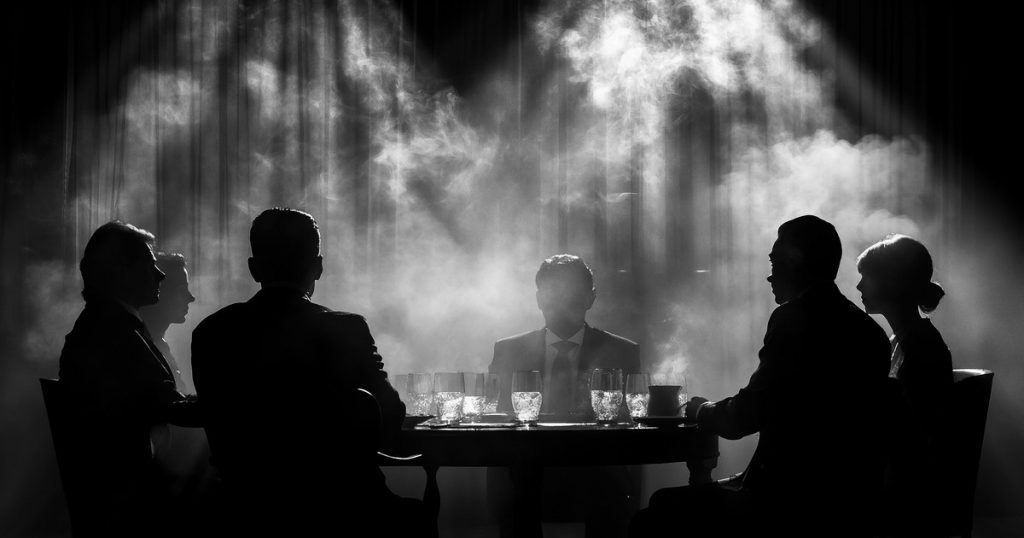Jesus said (John 3:19-21 ESV):
And this is the judgment: the light has come into the world, and people loved the darkness rather than the light because their works were evil. For everyone who does wicked things hates the light and does not come to the light, lest his works should be exposed. But whoever does what is true comes to the light, so that it may be clearly seen that his works have been carried out in God.
Introduction
This article will give a little bit of an update on the litigation between The Lutheran Church – Missouri Synod and Concordia University Texas, its President, Donald Christian, and its Chairman of the Board of Regents, Christian Bannwolf.
This week a motion for protective order was filed by CTX, Christian, and Bannwolf seeking to prevent discovery by The LCMS of what they did on November 8, 2022 and April 4, 2023. It turns out those deeds were done in darkness and now they seek to protect what they did in darkness.
Many readers already know the background of the litigation, but for those who do not, first I will provide a brief background before moving on to the new motion. The endnote[1] provides a list of my prior writings and radio interviews on the matter.
Brief Background
A majority of the board of regents of Concordia University Texas, under the leadership and influence of the board chairman, the university president, and its provost who this week was named as president, threw off the control, doctrine, and ownership of the university by LCMS on November 8, 2022. Without authority, they amended the university’s governing documents, denied any control of the synod’s school by the synod, denied the right of the synod to elect and appoint members to the board of regents, and declared that they alone would determine the extent to which they would retain the doctrine of the synod. On April 2, 2023, they acted to reaffirm those prior acts of rebellion (in violation of the Fourth Commandment) and theft (in violation of the Seventh, Ninth, and Tenth Commandments).
Last summer, the synod in convention overwhelmingly adopted Resolution 7-03, “To Call Concordia University Texas Leadership to Repentance,” Today’s Business, First Edition, 68th Regular Convention, pp. 139-141, just the resolves of which say:
Resolved, That the Synod in convention affirm CCM Op. 23-3006 in its entirety; and be it further
Resolved, That the Synod in convention affirmatively conclude that the CTX BOR members who voted in favor of the April 4, 2023 action that affirmed the CTX BOR’s purported separation have acted in direct conflict with the Constitution and Bylaws, as well as CCM Op. 23-3006; and be it further
Resolved, That the Synod in convention affirmatively conclude that the CTX president and those CTX administrators who have advocated for and supported the purported separation have acted in direct conflict with the Constitution and Bylaws; and be it further
Resolved, That the Synod in convention encourage the appropriate ecclesiastical supervisors to investigate and to determine any appropriate disciplinary action that should be taken against the CTX president and any member of the CTX BOR who is a rostered church worker; and be it further
Resolved, That the Synod in convention encourage the President of the Synod, LCMS BOD, the CUS and its board, and the appropriate district presidents to take all appropriate actions to address this situation; and be it further
Resolved, That the Synod in convention call upon the CTX president, those CTX administrators who have advocated for and supported the purported separation, and the CTX BOR to submit to the governance of the Synod as laid out in the Constitution and Bylaws; and be it further
Resolved, That the Synod in convention call upon the CTX president, those CTX administrators who have advocated for and supported the purported separation, and the CTX BOR to repent for having broken the Fourth, Seventh, Ninth, and Tenth Commandments, and to apologize publicly for the illegitimate and wrongful purported separation; and be it finally
Resolved, That the President of Synod stand prepared to grant holy absolution to those who repent and want to do better by rescinding their actions resulting in reconciliation and restoration.
The Motion: New Disclosures
The motion discloses that the actions on November 8, 2022 were taken “through a blind, confidential vote.” The acting board secretary, former regent Jim Cleary, “collected anonymous paper ballots of Regents physically present in the room.” The regents attending remotely submitted their votes to Cleary either by chat in Zoom or by email. The actions on April 4, 2023 were taken in a similarly blind and anonymous manner.
After the November 8, 2022 actions, regents Nathan Hill and Tom Zachman resigned.
After the April 4, 2023 actions, Regent Alan Taylor resigned.
Discovery: Was Ist Das?
Discovery is a process under the Federal Rules of Civil Procedure for parties to exchange information and records about a case. Before discovery rules were invented in the 1930s and 1940s, trials often were by ambush of surprise witnesses and evidence. The courts sought to remedy defects in civil trials. The trial is supposed to be a search for the truth, not a game of surprise gotchas. The opposing party does not have a fair chance to answer surprises and ambushes. Discovery was invented to aid the search for the truth and the right to a fair trial by requiring disclosures of witnesses, evidence, and exhibits ahead of time. This also has a number of other benefits, such as fostering settlement when the cards are on the table instead of held to the vest.
Discovery can be pursued by a variety of methods including requests for production of documents, written questions, oral depositions of witnesses, subpoenas to third parties who have relevant information, etc.
Discovery in this Case
The LCMS is seeking information about the actions on November 8, 2022 and April 4, 2023. It has requested a variety of discovery including deposition testimony and documents from Nathan Hill, Tom Zachmann, and Alan Taylor. CTX, Christian, and Bannwolf seek an order from the court to deny The LCMS such discovery.
The motion would protect deeds done in darkness.
Any lay person reading this can see that battles over discovery must be common, and they are. Overdone tactics commonly are employed on both sides of cases. On the requesting side, lawyers can get carried away with what they ask for. That is why motions for protective orders exist, to prevent abuses of discovery. On the other side, lawyers can get carried away with claims of privilege against providing discovery.
There are many other discovery requests in this case besides what I briefly described above. In an article like this for a general, lay audience it would not be helpful to get further down into the weeds with a lot of inside baseball. Suffice it to say that much of what The LCMS is requesting looks like ordinary, legitimate discovery. There are a few things they have requested that do strike me as overdone. A court can largely deny a motion for protective order but grant it here and there to correct excesses.
The Claims of Privilege
CTX’s, Christian’s, and Bannwolf’s claims for protection are that discovery would:
- Violate the First Amendment freedom of religion.
- Violate attorney-client privilege since their attorneys were present or somehow involved in matters on which The LCMS seeks discovery.
- Violate the attorney work product privilege.
First Thoughts
I am curious about that First Amendment claim. Let us remember that the synod created Concordia University Texas. CTX, Christian, and Bannwolf are agents, fiduciaries, and stewards of the synod. CTX is a child entity of its parent, The LCMS. They are supposed to follow the bylaws of the synod as to governance, property, doctrine, and all matters. As agents, fiduciaries, and stewards, they owe an accounting to their principal, parent, and master entity, The LCMS. “It is required of stewards that they be found faithful.” (1 Corinthians 4:2 ESV) “Give an account of your stewardship.” (Luke 16:2 NKJV)
How, one might be forgiven for wondering, could it be a violation of freedom of religion for a steward, an agent, a fiduciary, a child organization to give information about its stewardship to its parent organization, its principal, its master? How is it an invasion for the left hand of a multi-membered, multi-organed body to give information to the right hand of the same body?
Oh, but wait. Part of the action on November 8, 2022 and April 4, 2023 was to reject the doctrine of The LCMS and arrogate to itself the sole power to determine the doctrine of the university. So once you have two doctrines alien from one another, that is a difference of religion, and maybe that’s what CTX, Christian, and Bannwolf are thinking.
Similarly, if one gives legitimacy from ahead of time to the rebellion, so that CTX is not an agent, not a steward, not a fiduciary, not a child organization of a parent organization, not a synodical entity, then this is not discovery from left hand to right hand, not discovery from one member or organ of a single body to another member or organ of the same body. Instead, it is discovery between two different bodies.
See how the substance of the case could get tangled up in the procedural aspects about discovery. The right to discovery by The LCMS is being clouded in CTX’s motion by presupposing the righteousness of the rebellion and theft. Simply rebel and then say, because I am independent, you cannot discover anything from me about my rebellion or about my theft.
The court needs to consider this discovery question from the perspective of not having decided yet whether the actions November 8, 2022 and April 4, 2023 were legitimate. Evidence is supposed to precede judgment. The whole point of the suit is to determine whether those acts were legitimate, and it is an illogical short circuit to presuppose they were and, on that presupposition, deny discovery.
That would mean that the trial turns into this: You cannot discover evidence, and therefore you cannot present evidence at trial from which it could be determined whether the actions were legitimate. That trial becomes a sham. That trial is not deciding anything. The thing already has been decided, and without evidence. It is like saying, no, you cannot access the evidence, and then later saying at the trial, you failed to produce evidence, so you lose. We want to trust that this would not happen in a court.
Wider Consequences
If the court were to deny discovery on First Amendment grounds (or either of the other two grounds, for that matter), one wonders, would that mean that all the universities of The LCMS could claim that it was a violation of their religious freedom to be expected to give an account of their stewardship to the synod?
If so, then why, in principle, would that not apply to every other synodical entity? Why, for one example, would it not privilege the President and Board of Directors of Concordia Publishing House to decline to account to The LCMS for its stewardship of its publishing work for the synod. Why would CPH be required any longer, for example, to submit publications to the synod’s Commission on Doctrinal Review or abide by decisions of the Commission on Constitutional Matters? CTX has gone past rogue to imposter. Why can’t everyone else? How many synods do we really have?
So, one might wonder, what all is at stake here? The motion was just filed this week, so I doubt anyone has had time yet to think this through, except maybe Kristi Kirk, who has been thinking about changing the relationship between Lutheran universities and their parent Lutheran synods since her doctoral dissertation on the subject: Kristi K. Kirk, The Changing Nature of Church College Relations: A History and Case Study of Concordia University Texas, Ph.D. Dissertation, Capella University, 2013. Now she has been named CTX’s President. Sometimes when people say stuff, like she did in her dissertation, you ought believe them.
[1] This endnote gathers a list and links to essays that I have written and radio interviews that I have done on the CTX matter.
- The Sovereignty of Nebulous Ethos at Concordia Texas, Brothers of John the Steadfast, June 16, 2023.
- Two Simple Questions about Concordia Texas Throwing Off the Bylaws of the LCMS, Brothers of John the Steadfast, July 10, 2023.
- Supporting the CTX Rebellion: Is Congregations Matter Sleep Walking?, TRHalvorson.com, July 24, 2024.
- Fox Guarding the Henhouse at Concordia University Texas, TRHalvorson.com, July 28, 2023.
- Open Arms in Missouri, Brothers of John the Steadfast, August 1, 2023.
- Complaint Filed in LCMS v. Christian, Bannwolf & Concordia University Texas, Brothers of the John the Steadfast, September 7, 2023.
- LCMS v Concordia University Texas: Some Related Documents, September 12, 2023, Brothers of John the Steadfast, September 12, 2023.
- LCMS v. Christian, et al. and 1 Corinthians 6, Brothers of John the Steadfast, September 19, 2023.
- Concordia University Texas Litigation Resumes, Brothers of John the Steadfast, December 21, 2023.
- Concordia University Texas Seeks to Avoid Federal Jurisdiction, Brothers of John the Steadfast, January 22, 2024.
- Concordia University Texas Appeals to Caesar to Seize Property and Power, Brothers of John the Steadfast, January 25, 2024.
- LCMS Persists in Asserting Federal Jurisdiction of Concordia University Texas Case, March 4, 2024
Pastor Todd Wilken has interviewed me in the following episodes of Issues, Etc.
- 1731. An Attempt by Concordia University Texas to Reject the Governance and Oversight of the Lutheran Church Missouri Synod – Tom Halvorson, 6/22/23.
- 1952. An Update on Concordia University Texas’ Attempt to Reject the Governance and Oversight of the Lutheran Church Missouri Synod – Tom Halvorson, 7/14/23.
- 2123. The 68th Regular Convention of the Lutheran Church Missouri Synod – Mark Stern & Tom Halvorson, 7/31/23.
- 2142. Votes at the 68th Regular Convention of the Lutheran Church Missouri Synod about Concordia University Texas and the Concordia University System – Tom Halvorson, 8/2/23.
- 0391. An Update on Concordia University Texas’ Attempt to Reject the Governance and Oversight of the Lutheran Church Missouri Synod – Tom Halvorson, 2/8/24.




